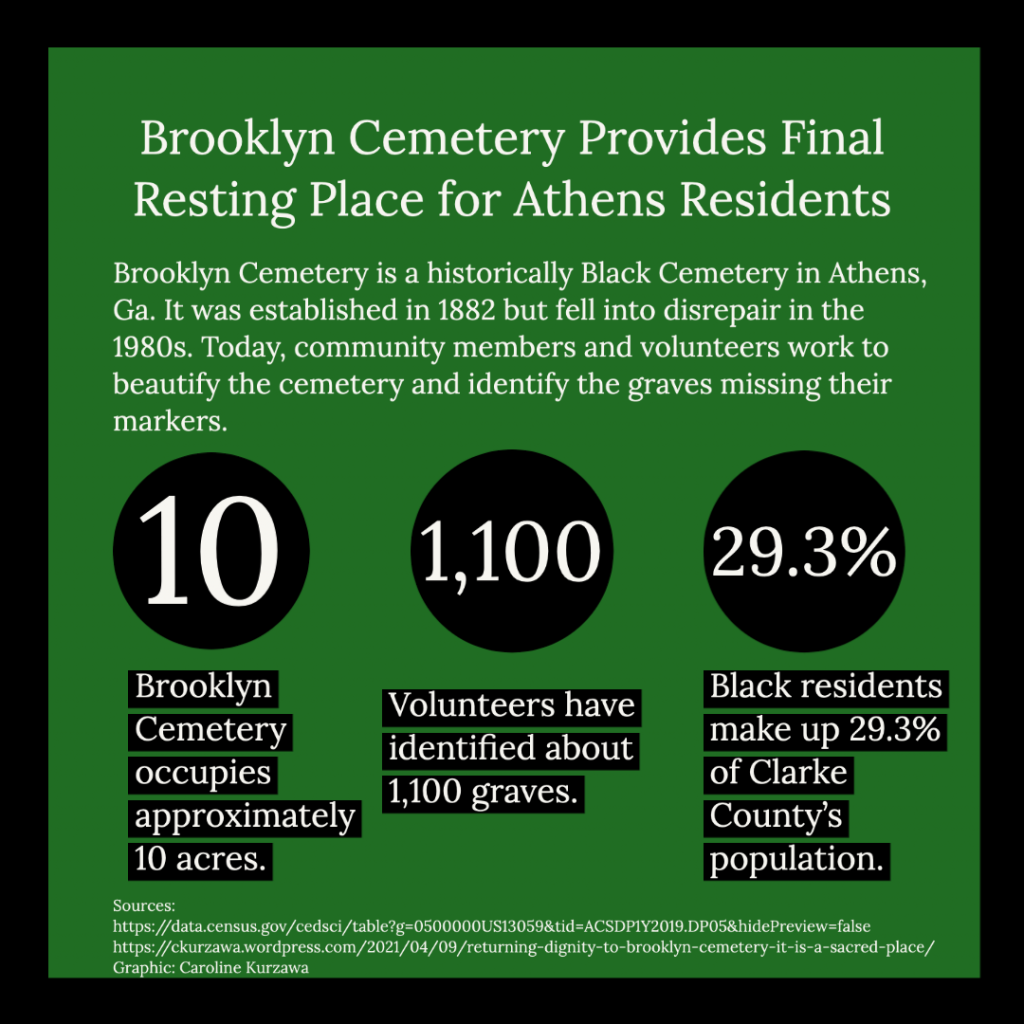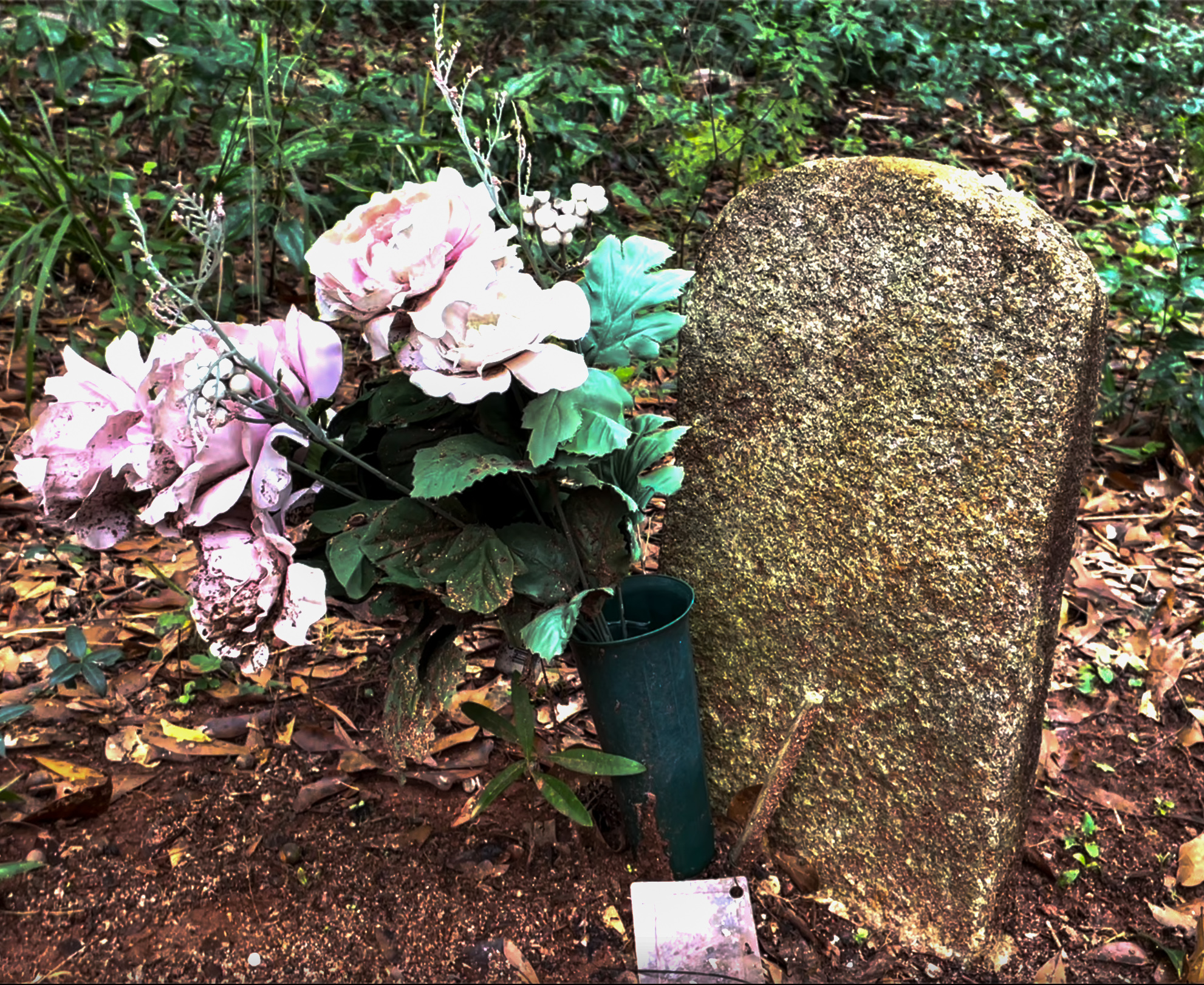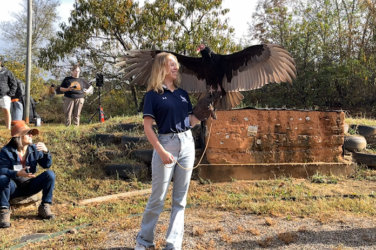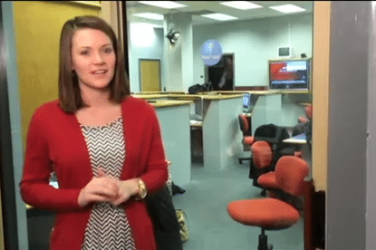The atmosphere in Brooklyn Cemetery holds the stories of past Athens residents and represents a strong tie to the past. Local residents are working to restore Brooklyn Cemetery, a historically Black cemetery in Athens, Georgia after it fell into disrepair in the 1980s.
As volunteers continue to beautify the cemetery, community members reflect on what the cemetery means to them and their hopes for Brooklyn’s future.
Why It’s Newsworthy: Brooklyn Cemetery is an important part of Athens history for not only residents who have family there but also the larger Athens community, making the restoration effort a community effort.
Linda Davis, one of the founding members of Friends of Brooklyn Cemetery, is passionate about Brooklyn’s restoration and is most excited about the plans for an reinterment site for remains not originally buried at Brooklyn.
“I am so motivated to build the pearly gates of heaven for those people,” Davis said.
Davis shared that they have chosen a design for the site and are going through the final stages of reviewing it. This design was created through collaboration with Katherine Melcher, an associate professor at the University of Georgia’s College of Environment and Design, and her students.
Valued Support of the Community
Davis reiterated that the present restoration and the path forward, with larger projects like the reinterment site, continues to rely on the support of volunteers who come out to clear weeds, putting in the hard work it takes to bring Brooklyn’s natural beauty back to life.
This fall, over the course of three different sessions of Dawg Day of Service, the cemetery saw more than 300 volunteers.
Alyssa Ginn, a third-year student at the University of Georgia, works as a service ambassador for ServeUGA and leads student trips to Brooklyn during the school year to lend a hand to the restoration effort.
Ginn explained that the cemetery is more than a final resting place for Athens residents.
“People don’t usually consider things like cemeteries to be like, like community centers, but I, I they genuinely are,” Ginn said.

Descendants of Brooklyn
Family members of those buried at Brooklyn still live in or around Athens. Alvin Sheats remembers coming across the cemetery as a child, only to find out later that his grandmother was buried there.
Sheats sees Brooklyn as a critical piece of history that must be maintained.
“It’s important that, that we hold on to any of our history and legacy in this community,” Sheats said.
Robert Harrison has a great-aunt and a great-uncle buried in Brooklyn, and as restoration efforts continue, he hopes Brooklyn can reach a point of only needing regular maintenance care, rather than the laborious hours currently required. He sees Brooklyn as another “piece of the puzzle” of Athens’ history.
Harrison explained that a complete collection of records of those buried is also necessary to carry history forward.
Unfortunately, this is an issue that plagues many descendants since funeral home records were either lost or not originally documented.
Elizabeth Platt understands the pain of lost records all too well because both her aunt and her mother are at rest in Brooklyn. However, she has not been able to find her mother’s grave since she was originally buried.
The funeral home has no record of her mother’s location.
This frustration stirs up hurt and a hope that people will notice how important it is to revere the deceased.
“I think all cemeteries, not just the African American ones, but any cemetery should be preserved. All of them. Because you have remains of loved ones buried there, and they belong to someone,” Platt said.
There are an assortment of different grave markers in Brooklyn. Graves with missing markers are indicated with PVC pipe acting as a temporary marker. Still, family members may not be able to identify their family’s graves.
Working Against Barriers
Brooklyn’s restoration is assisted in part by donations and volunteers’ time but is also limited by resources and past events beyond current control. Specifically, the proposed reinterment site will require additional funding, and the lack of records from the past makes it difficult for volunteers to identify graves for descendants.
“We’re slowly overcoming the barriers that would prevent us from going forward, and I think we can only do that through experience,” Davis said.
Davis shared that the cemetery has joined the Black Cemetery Network, a coalition of Black cemeteries across the nation. This resource helps connect people with ideas that have been successful in restoring cemeteries.
Davis says she is grateful for the community support around the restoration and will continue to lean on the community as she works to build those “pearly gates.”
Caroline Kurzawa is a senior majoring in journalism in the Grady College of Journalism and Mass Communication, minoring in women’s studies and earning a Public Affairs Communications Certificate at the University of Georgia.








Show Comments (0)